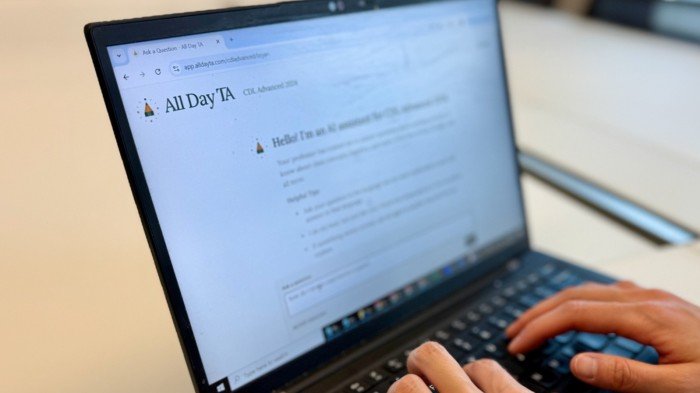The debut of OpenAI’s ChatGPT sparked a wave of experimentation with artificial intelligence in business education and, more than two years on, the technology is reshaping how knowledge is delivered and absorbed.
Challenges nonetheless persist: adoption is uneven, ethical concerns linger and the role of human instructors continues to evolve, even as AI cements its place in the curriculum.
But at the University of Toronto’s Rotman School of Management, professors Joshua Gans and Ken Bryan saw an opportunity to streamline student support. After ChatGPT was launched in late 2022, Gans and Bryan developed a basic AI assistant and trained it on their lecture materials. They were impressed by its accuracy.
“The quality of the answers amazed us,” recalls Gans. Encouraged by its success, they introduced the All Day TA tool to a class of 300 students. Over a 12-week semester, the AI fielded 12,000 queries.
“The bot can answer instantly, instead of students having to wait for a response,” says Gans. “And they could ask questions that might be embarrassing in front of a room full of people.”
What started as a small pilot at Rotman has now been adopted by around 100 universities and business schools, Gans says, including some of the leading providers of online MBA programmes. The response from teaching faculty, Gans says, has been overwhelmingly positive.
“There’s no resistance,” he says, with some even funding it themselves. At $2 per student, the cost is minimal, and it takes only minutes to set up, he adds. Faculty can upload their course materials, enabling the AI to provide responses tailored to their curriculum.

All Day TA is one example of AI’s expanding role in online education. Business schools are integrating AI-powered teaching assistants, automated feedback systems and AI-driven grading tools to enhance learning and streamline assessment.
Leah Belsky, vice-president of education at OpenAI, points to rapid academic adoption, with one in three US students using the chatbot today. “One of the most powerful applications of AI is to advance educational outcomes,” she says. “It can make education more personalised, ‘just-in-time’ and engaging.”
But Belsky adds that AI literacy is, simultaneously, a pressing concern. “AI could exacerbate inequalities if only some people know how to use it powerfully while others don’t,” she says. To bridge this gap, she suggests universities should integrate AI into teaching, providing both faculty and students with the skills to make the most of these tools.
That, however, comes with a price tag. “The elephant in the room is cost,” says Matt Robb, a partner and education lead at consultancy Deloitte. “Implementing and maintaining these systems requires significant investment.”
In online education, where larger class sizes can leave students waiting a while for feedback, technology offers a way to close the gap. “Students sometimes express valid concerns about receiving timely feedback,” says Robb. “They can find delays discouraging, and timely feedback is essential for effective learning. AI offers a solution.”
The impact of AI extends beyond the classroom into the workplace, where employers now expect business graduates to be AI-literate. In response, business schools are integrating AI into coursework while also teaching students when to rely on it — and when human judgment is essential.
But knowing how to use AI alone is not enough. “The harder skills to develop are critical thinking and the ability to identify and test for disinformation,” says Paul Kett, global director for skills and education at advisory firm PwC. “In a world where contested information is becoming more common, those interdisciplinary skills become that much more important.”
That is exactly what some educators worry AI could erode. Vishal Sachdev, a professor at Gies College of Business, at the University of Illinois at Urbana-Champaign, says students risk “cognitive offloading” — using AI as a shortcut, rather than engaging deeply with course material. “There’s nothing transformative in using chatbots, because they’re still not very accurate,” he adds, pointing to how they often generate false or misleading information, called “hallucinations”.
So while he uses chatbots at Gies, Sachdev sees AI’s greatest value as beyond simple Q&A support — as a brainstorming tool and aid in learning, grading and even assessment.
Business school faculty are split on AI. Some view it as a powerful teaching tool, while others worry it could undermine learning and academic integrity. “I’ve seen a mixture of surprise, enthusiasm, concern and trepidation,” says MIT Sloan School of Management professor Eric So, who leads a group of faculty who are integrating AI into teaching.
He recognises AI’s value for professors: it aids in brainstorming, updating course materials and creating interactive tools. However, it also disrupts traditional coursework and assessment methods. “It’s quite difficult to design assignments that can be done without AI,” says So. “I suspect much of our curriculum will be redesigned from the ground up.”
Christian Terwiesch, a professor at the University of Pennsylvania’s Wharton School, found that ChatGPT outperformed some students in his operations management class.
The reception of AI in education has flipped. Initially, many educators saw it as a threat, with concerns over cheating and misuse leading some schools to ban it outright. Now, that resistance is fading as institutions find ways to integrate AI into teaching instead of fighting it.
“When generative tools first appeared, we saw the risks rather than the opportunities,” says PwC’s Kett. “And there was a lot of ‘we cannot possibly allow these tools to be used’. But we’ve very rapidly gone past that, to seeing lots of positive opportunities for higher education.”
